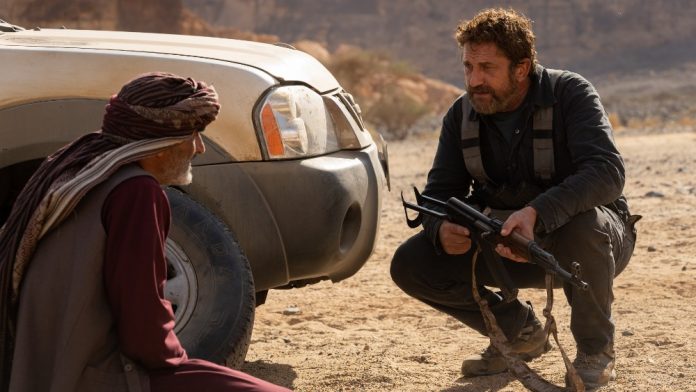Kandahar is the third movie that director Ric Roman Waugh has made with actor Gerard Butler following 2019’s Angel Has Fallen and 2020’s Greenland, but it’s also a very different movie than those two — more grounded in reality with far fewer fantastic elements than the latter.
In Kandahar, Butler plays undercover CIA operative Tom Harris, who gets stranded in a hostile area of Afghanistan and has to turn to his Afghan translator Muhammad/”Mo” (Navid Negahban) to help him get out of the danger zone while being tracked by those who want them both dead.
There have been plenty of movies set in Afghanistan and Iraq post-9/11 — both narrative features and documentaries — but Kandahar is quite different in that it doesn’t involve the military, and it’s much more of a political thriller that uses its action scenes and explosions as part of the story rather than to make the movie feel more “Hollywood.” (Besides Butler, Travis Fimmel is one of the few other non-Arab actors in the movie.)
Above the Line spoke with Waugh a few weeks back on Zoom, where he talked about Kandahar‘s fantastic locations in Saudi Arabia — only the second Western film to be shot there! — and working with Butler as an actor and producer before offering a few tidbits about why he was interested in taking on the Cliffhanger relaunch with Sylvester Stallone.
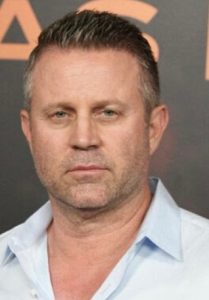
Above the Line: Last time we spoke, I think you were already in Saudi Arabia scouting for Kandahar, but how did this project originate? And I believe this is the first produced screenplay for Mitchell LaFortune, so how did the script make its way to you and Gerry?
Ric Roman Waugh: When I was making Greenland, [Producer] Basil Iwanyk had brought up a writer, Mitchell LaFortune, [who] I met and brought on to Greenland with me to do all the rewrites and see the production drafts through. I just really hit it off with him. He’s a lovely individual, and I have a big affinity for veterans. I served our country in the DIA for a number of years and one day, Basil just said, ‘By the way, did you ever read his script, Burn Run? It’s based on his experiences, and inspired by true events of a CIA operator [who] went on the run.’ When I read it, it just blew me away. To me, it’s what I loved — and I know many people loved — about how Sicario gave you a different lens into the war on drugs and then humanized the experience so you understood more about the human toll of what was going on — not only the people trying to enforce it but the people [who] are stuck in the corruption of it.
What I loved about this is, I felt it was Sicario in the Middle East. It was the first time I had seen a movie or a script that wasn’t just [from] the Western point of view, that it gave you the other side of it as well — of the people [who] have been chosen to enforce policy by the policymakers themselves. What are their lives like, [as they’re] trying to get back to their own families as well?
The human side of it was really interesting to me, and the first person I thought about was Gerry. We had just finished Greenland, and he read it right away and got how it could be our Searchers or Lawrence of Arabia, where it was this epic scope of the region. At the same time, it was also about the human side of it on all sides. He really embraced the [Eduard] Roschmann point of view, as well. As much as many of our big movie stars are like [motions to mime a camera] ‘You put it right here, and everybody else, you don’t worry about them.’ He was very generous, and in fact, probably one of the biggest enforcers of not losing character moments from the other points of view.
ATL: I didn’t watch the trailer for Kandahar before watching the movie, but you and Gerry had already made two other movies, so I had certain expectations heading in, and it was actually very different than what I was expecting. It was more serious and grounded in reality, and, like you say, he has these great Arab actors who get to share the spotlight.
Waugh: You and I have talked about it, Ed. These movies are getting harder to make, and they’re harder to get made theatrically. When they come around, and they’ve got a really interesting and unique point of view, I’m going to do everything I can to go make that happen. This is one of those that we just all fell in love with. It was familiar territory [in] the Middle East, but the lens is what made it unique — it had a very distinct point of view that we haven’t seen before.
ATL: I had the pleasure of talking to Basil once before, I think for The Town. I know that his background is that of a location manager, which you see very clearly in his work on the John Wick movies, which are shot in these really interesting places. How did this one end up being in Saudi Arabia vs. other places that often double for the Middle East? I read that it was only the second American movie ever filmed there, is that right?
Waugh: We were the first major motion picture from Hollywood to shoot there since Lawrence of Arabia, and then they also did a different one called Desert Warrior right after us, but it wasn’t really this Western thing that we were doing, a contemporary movie like this. It was an amazing experience. We originally talked about Jordan and Morocco and Abu Dhabi, the places that we normally would go to, and then Basil brought up that he had been talking to the Saudis. I’m like, ‘What does that even mean? What do you mean the Saudis?” And he was like, ‘There’s this whole new movement there of bringing culture to the region, but really embracing the film community. They’re ready to really embrace this.’
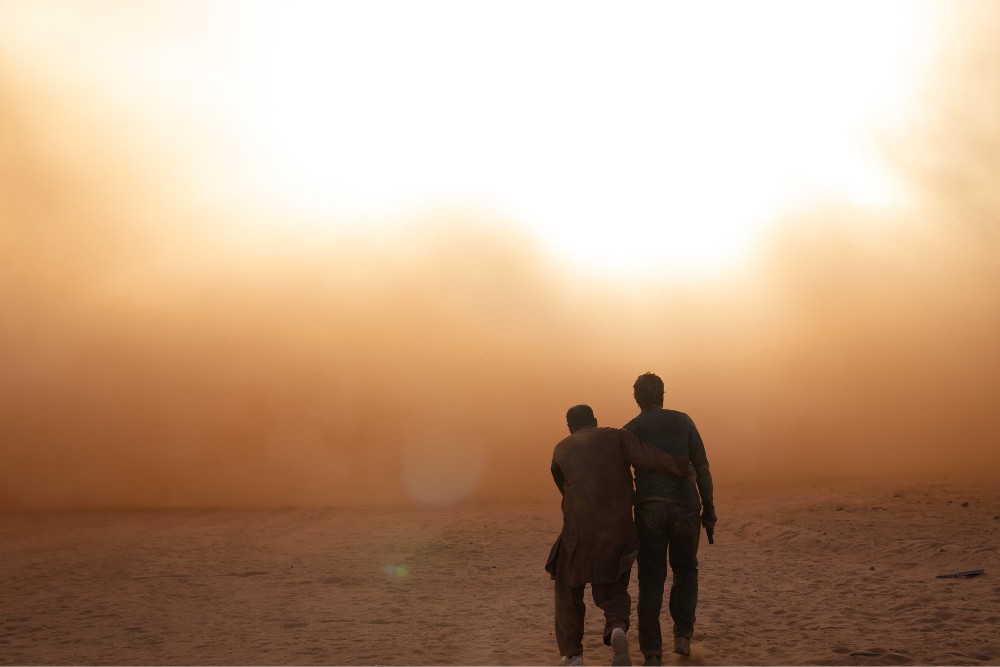
What I loved is that we live in a world now [where] we’re going to all these tax incentive areas, and a lot of the time, half the crew, they’re punching a clock and going home and not really invested in the picture the way we are. On this one, I brought about 450 people from 25 countries around the world to Saudi Arabia — all religions, all genders, everything. It was an amazing cultural experience for everybody. You didn’t go there for a tax incentive, you went there to be a part of something. I think that’s what made this [such a] passion for everybody. I genuinely thought some people would quit and go, “This is just not for me.” Not one person quit; everybody stayed. In fact, we had one poor girl in makeup have an appendix problem, [so] she got her appendix out, and four days later, she was back working with us. It was that kind of commitment that I think made Kandahar special.
ATL: You mentioned bringing in a lot of people, so did the area not have an infrastructure for filming?
Waugh: Define ‘infrastructure,’ because there was zero. We even had accommodation issues, because we were out in the middle of the desert. Even trying to house people, let alone generators, and all the things we use, we had to bring everything. Not only that, but help write into law how we move pyrotechnics around, how we do things in our world, where they deal with real-world terrorism on a daily basis and [the constant] threat of terrorism. And yet, we’re bringing in [a] heavy arsenal of pyrotechnics, where we’re lifting two tons of sand in the air during explosions.
Getting them to understand how we do this safely, [and] not only on set but how you transport this stuff [safely]. There was a lot of give and take of us helping them to understand our business, but also reminding everybody on my side, you need to understand their side of it, so that we understand what makes them feel comfortable with what we’re doing. They deal with real-world issues. We’re in the land of make-believe — they’re not dealing with make-believe. It’s real.
ATL: I always wondered about stuff like that, shooting a movie with this subject matter in that area. The movie does look great, and I wish I had seen it on the big screen, but that location for the final setpiece still looked fantastic and unlike anything I’ve seen before — maybe because so many of these movies shoot in Jordan or Morocco.
Waugh: That was the big thing for me — I got to be in virgin territory. I got to be the discoverer of new locations. The first thing I told Basil when we did this is, ‘I’m not going to New Mexico. I want to shoot this in the region, and I want David Lean and John Ford to be my guides. I want big scope, so we need to go into regions that we can shoot with big, wide angle lenses and shoot everything and not be afraid of the city that’s on this side and the McDonald’s that’s on [that] side.’ We went into very big areas where you didn’t have to worry about any of that.
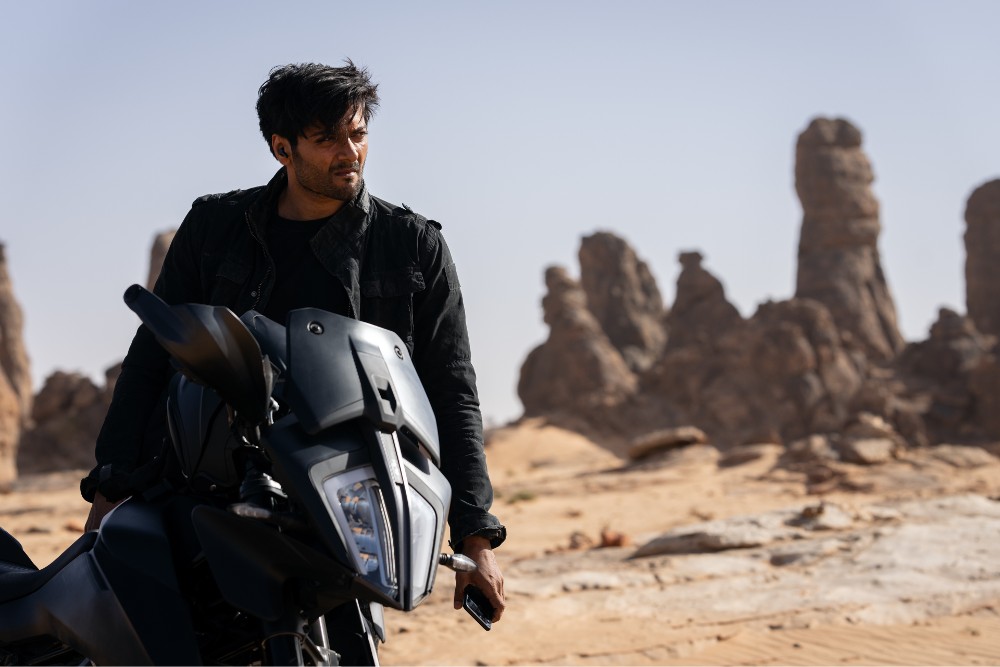
ATL: How did you go about finding I know that Navid and Ali have both been in a lot of stuff, but how did you go about casting them and bringing them out to Saudi Arabia, since I imagine they usually work in and around America…
Waugh: Navid is based in Los Angeles and Europe as well. I first read Mo, and then I talked to him and really understood his background of being a guy [who] was born in Tehran and left as a child refugee during the Iran-Iraq War, and his father being from Taybad, which is very much near the Afghan border and Herat. He lived this firsthand, and I could tell the passion and the drive [he had for] wanting to tell this story.
And then, the other cast members, we just really wanted to find new and fresh people that didn’t feel like the regurgitated version of what we’ve seen before, [like], “Here’s the same guy. Here’s the same girl.” And then, it was the great discovery of me looking at Ali Fazal, who’s a very big deal in Mumbai, and has done Death on the Nile and been in Furious Seven, and so forth.
To find that really cool guy [was hard] because when we read the script and the character of Kahil, we knew we had something with him. We knew that was a really fun character to deal with. Ali brought his own sensibilities, talking about an Indian who has family in Pakistan and what that whole thing is like in the divisive world that they live in, and their side culturally and so forth.
We brought people [in who] not only were really talented like Bahador Foladi, [who] plays Farzad, but they also brought their own personal stories and their relationships to the region and how it meant the woman [who] Navid meets in the middle of the dark, Najia Khan, she was a real Afghan refugee as a child. She’d never been on camera before. This is not what she does. She’s a documentarian, and the emotion you saw was one take, and that was her own emotion pouring out.
ATL: It’s a really daring film, not just in terms of shooting in Saudi Arabia, but also, only casting a few actors who aren’t of Arab descent, which rarely happens in Hollywood movies.
Waugh: I wanted to show the other side of it. I want you to view my movies — and we’ve known each other for a very long time — to me, my antagonists are always the subject matter, not the people, and so even some people you’d consider an antagonist, I wanted you to feel their death. Some people need to die, and it’s okay — let them die. But other people, you feel empathy for them, because they were just trying to return home to their family, and we wanted to show that point of view. Gerry was a huge, staunch supporter of that. He would not let go of making sure that every other character had their voice and their [own] human side of it. He didn’t want it just to be all about Tom.
ATL: We know that Gerry is a dedicated actor who can do many different things, but what’s it like working with him as a producer? I’m always slightly cynical with actor-producers for the very reason you mentioned — many of them just want the focus of the movie to be on them, sometimes to the detriment of the movie itself.
Waugh: He doesn’t get involved in the day-to-day producorial stuff. He doesn’t get in my face about how I’m directing the movie. He’s very respectful in that way. Where he does get involved, we have a great [collaboration], sometimes with friction. Friction happens, naturally, when two people are passionate, and their points of view might be askew with one another, [so] you have to find that common area [in terms of] how to achieve it and raise the bar.
When it comes to the creative part of it, he’s very much involved. I like that I have a partner [who’s] passionate about what we’re making, and not the [kind of] guy you have to remind what the hell the scene’s about. He’s very much invested in it. If we have a dustup every once in a while about trying to sort through something, I think that’s great, because it [keeps] both of us honest. It keeps us both on track [in terms] of trying to raise the bar [so that we] never rest on our laurels.
ATL: Again, I went into this movie not knowing much about it, but I hope that people aren’t cynical about it because of Guy Ritchie’s The Covenant, which is also very good but a very different movie involving an American and their translator. Do you feel like Americans are open to another movie set in that region?
Waugh: I’m up against The Little Mermaid, so we’ll see [how it does]. I did not see the Guy Ritchie movie. I’m obviously invested in what I’m doing here, and I try not to be pulled in either direction and stay on point. What I always loved about this movie — and we were always gonna keep it this way, even before the U.S. withdrawal — is [that] I liked that it wasn’t about fatigues, and it wasn’t about military stuff anymore. This is the CIA. This is inspired by true events. This is about the black ops world, about the people infiltrating. I love that Spy Games feel to it. To me, this was much more Spy Games-[style] spy world than it was ever going to be about the military component.
When the U.S. withdrawal happened and it went to this “all is lost” mentality, it just made the characters [richer] — not only a guy like Tom [who’s like,] “What were the last 20 years about? Why did I sacrifice knowing who my daughter is?” With Mo, “At first, I thought I was only a refugee in America but maybe America is now my home, and what does that mean? Because there is no more home in Afghanistan.”
For me, it was much more about the contemporary world and also getting away from all the dusty war movies that we have seen — not that Guy’s movie is dusty, I haven’t seen it — but the look of those, I wanted something much more fresh and modern and [that would] show this culture clash that’s going on in [between] ultra-conservatives and the progressive movement [set against] the lush scenery of Dubai versus the old ancient towns and the old Jetta and [some of the] places we shot.
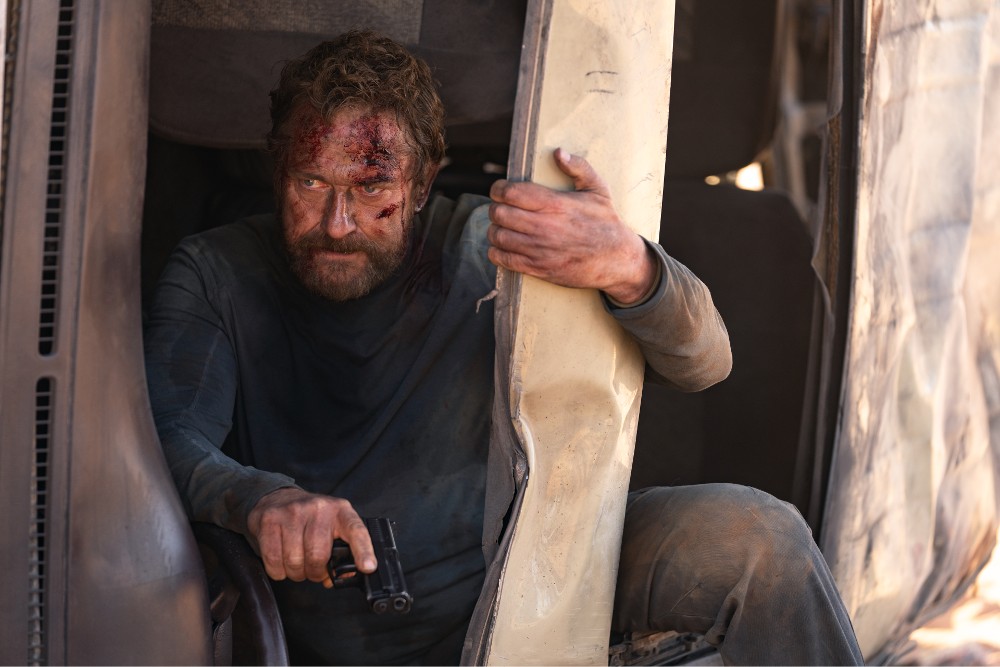
ATL: Obviously, with the Writers Strike, all pens are down right now and not much is going on in terms of development, but I remember that you used to write a lot of your own material, and you’ve drifted away from that a little bit lately. Was that a conscious choice, to focus more on directing, or is it just a matter of you feeling passion about these other writers’ scripts that have landed in your lap?
Waugh: I think it’s conscious in a way that I’m trying to direct more. When I write from origin, that’s an endeavor — it takes longer. There are some people [who] I’ve heard [can just] knock out a draft, and I don’t know where that comes from. For me, it’s a little bit more of a longer gestating kind of thing. I’m writing on all the things that I work on. I wrote on Greenland, I’ve written on Kandahar, I wrote a National Champions, and I’ll continue that way.
There’ll be some things that I probably will originate, but I’ve gotten to the place of just looking for those pieces of material that speak to me and have a different point of view or have something to say, [and] again, heighten the peas and the mashed potatoes, [offering] a big form of entertainment, but there’s something within it that will strike a chord with people and make them talk, [and] not having not given them my opinion, but just given them what the subject matter is about. If I can bring in my voice and help shape it, that’s still really rewarding to me. Will I write original content? Yeah, that’s 100 percent gonna still happen.
ATL: And your next thing is doing a couple of sequels to movies that have done well for you and Gerry. It’s new territory for you with different pressures, no?
Waugh: We live in the sequel world, Ed. The sequel to Greenland is going to be a great continuation of the first movie, [exploring] what happened after the extinction event. What happened after the impact? How do they survive? Who survived? And how did they actually rebuild? That’s a really fun exploration that feels super original. As much as it’s a sequel, it’s a continuation in a way that’s not the original story regurgitated.
[With] Cliffhanger, [which] I just came onto, there were other versions, [so] they were trying to do the classic remake version [at one point, but] what I love about this version is they’re not doing that. What we’re doing now is more like Creed or Top Gun: Maverick, where it’s carrying the original movie forward, Stallone [will be] playing the age he is now, [and he’ll have a daughter, [and they] have a mountaineering company together, and then all hell breaks loose. [It’s about] the passing of the torch and watching the next evolution.
I think we’ve been indoctrinated with this new version of streaming cable series where we live in a lot of serial storylines. We love that idea of being invested in a storyline that continues [and] gives us fresh angles, but we always remember who that was and what that one moment was. I liked that we’re kind of going that way in sequels now that they’re not these dumbass remakes that just take the title and try to regurgitate something versus taking what people love — the essence of it — and carrying it forward in a really cool, organic way. I’m embracing that. I think it’s really interesting. Will there be more sequels? Probably not. But these two… I’m not gonna pass up Cliffhanger. I love what that movie is. I love the original, and Greenland is very, very close to my heart.
Kandahar is now playing in theaters nationwide courtesy of Open Road Films.


